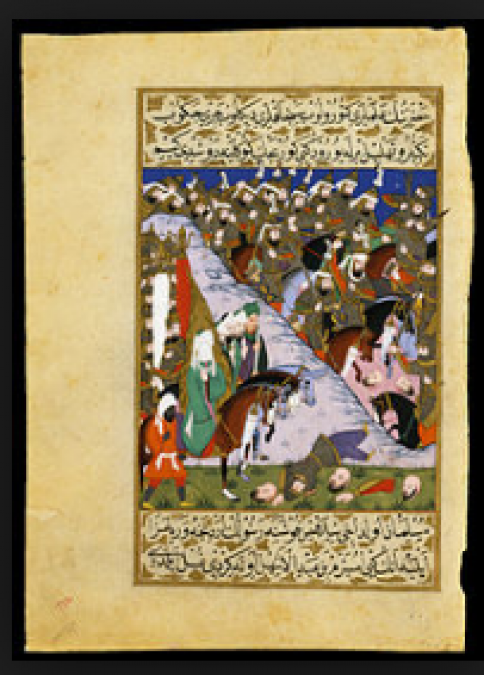
The second battle between Muslims and the Makkans, the Battle of Uhud is seen in Islam as evidence that victory is never guaranteed, disobedience and greed cause defeat, and neither defeat nor victory are permanent. The Makkans were a society described as being rife with vices and oppression, perversion, and ignorance. Another lesson Muslims take from the Battle of Uhud is obedience to Prophet Muhammad, for without it, as the archers in this battle experienced, there are negative consequences.
In A.D. 625, the Muslims of Madinah learned a difficult lesson during the Battle of Uhud. When attacked by an invading army from Makkah, it initially looked like the small group of defenders would win the battle. But at a key moment, some fighters disobeyed orders and left their posts out of greed and pride, ultimately causing the Muslim army a crushing defeat.
The Muslims Are Outnumbered After the Muslims' migration from Makkah, the powerful Makkan tribes assumed that the small group of Muslims would be without protection or strength. Two years after the Hijrah (the migration of Prophet Muhammad and his followers from Makkah to Yathrib), the Makkan army attempted to eliminate the Muslims in the Battle of Badr. The Muslims showed that they could fight against the odds and defend Madinah from invasion. After that humiliating defeat, the Makkan army chose to come back in full force to wipe out the Muslims for good.
They set out from Makkah with an army of 3,000 fighters, led by Abu Sufyan. The Muslims gathered to defend Madinah from invasion with a small band of 700 fighters, led by Prophet Muhammad himself. The Makkan cavalry outnumbered the Muslim cavalry with a 50-to-1 ratio. The two mismatched armies met at the slopes of Mount Uhud, just outside the city of Madinah.
also read Unimaginable! By stealing things from this temple every wish get fulfilled
Defensive Position Taken at Mount Uhud Using Madinah's natural geography as a tool, the Muslim defenders took up positions along the slopes of Mount Uhud. The mountain itself prevented the attacking army from penetrating from that direction. The Prophet Muhammad assigned about 50 archers to take up post on a nearby rocky hill to prevent the vulnerable Muslim army from attack at the rear. This strategic decision was meant to protect the Muslim army from being surrounded or encircled by the opposing cavalry. The archers were under orders to never leave their positions under any circumstances unless ordered to do so.
The Shifting Battle After a series of individual duels, the two armies engaged. The confidence of the Makkan army quickly began to dissolve as Muslim fighters worked their way through their lines. The Makkan army was pushed back, and all attempts to attack the flanks were thwarted by the Muslim archers on the hillside. Soon, Muslim victory appeared certain. At that critical moment, many of the archers disobeyed orders and ran down the hill to claim the spoils of war. This left the Muslim army vulnerable and shifted the outcome of the battle.
The Retreat As the Muslim archers abandoned their posts out of greed, the Makkan cavalry found their opening. They attacked the Muslims from the rear and cut off groups from one another. Some engaged in hand-to-hand combat, while others tried to retreat to Madinah. Rumors of the Prophet Muhammad's death caused confusion. The Muslims were overrun, and many were injured and killed. The remaining Muslims retreated to the hills of Mount Uhud, which the Makkan cavalry could not ascend. The battle ended, and the Makkan army withdrew.
also readToday is Apara Ekadashi; Know the fasting rituals and its significance